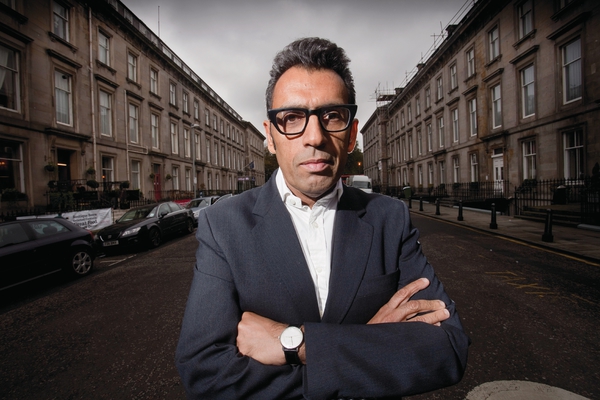Keeping the peace
Darra Singh is the man the government has tasked with discovering what caused the summer’s riots. So who is he and how is his work progressing? Lydia Stockdale finds out
Darra Singh is a difficult man to keep up with. Constantly on the move, he’s in the middle of an intense few weeks travelling around the UK, gathering information from communities with the aim of finding out what caused the riots that swept England in August.
Shortly after the summer’s disturbances, deputy prime minister Nick Clegg announced that Mr Singh, who until the end of last month was chief executive of Jobcentre Plus, had been appointed to chair an independent communities and victims panel.
The three panel members - Simon Marcus, founder of an education project for young people at risk of gun crime; Heather Rabbatts, former barrister and government advisor; and Maeve Sherlock, former head of the Refugee Council and chair of social enterprise Chapel St - and their chair are to gather a grass roots-level view of why the rioting and looting took place. They will then present recommendations to prevent similar unrest in future.
Despite the breakneck pace of his schedule, Inside Housing, which is also examining the causes of the disturbances as part of The Riot Report it is producing with the Chartered Institute of Housing and National Housing Federation, managed to catch up with Mr Singh in Scotland, in the lobby of the hotel where he’s staying in Edinburgh.
The riots did not spread to Scotland, but Mr Singh is here to speak about the work the panel is doing at the annual Society of Local Authority Chief Executives conference, which brings together council heads from across the UK.
The 52-year-old is among former peers at the event - he was previously chief executive of Luton and Ealing councils. Before that, though, his career was almost entirely in housing, starting as a volunteer case worker and working his way up to chief executive of 3,000-home Asra Greater London Housing Association and 3,600-home Hexagon Housing Association.
When we arrive to meet him, Mr Singh - easy to recognise in his smart, fitted suit and thick black-rimmed glasses - is in the middle of a phone call, but he cuts the conversation short to direct us to a table in a quiet corner of the room so we can begin the interview.
Our time is short; Mr Singh is a very busy man. His panel has until next month to deliver its interim report, and is due to present its final conclusions to prime minister David Cameron, his deputy Mr Clegg, and Labour Party leader Ed Miliband, in March.
So just how much has Mr Singh got to cram into the next two months and how is his work progressing so far?
Gathering data
‘The aim of the initial report and final report is to reflect the views that have been put to us, but also to see what sense we can make of those views, what are the key and reccurring themes,’ he explains as we settle in. ‘And then to look at what it is that we believe, from what we’ve heard, needs to be done to deal with these kinds of situations and prevent them from happening again in the future.’ Clearly, then, Mr Singh’s life isn’t about to slow down in the immediate future.
There were around 19 local authorities in London and 10 or so outside the capital that experienced rioting and looting, sums up Mr Singh. So far the panel has visited 10 councils where disturbances took place, including Manchester, Salford and Wolverhampton. The job doesn’t stop there though - it also involves meeting local authorities in areas where unrest did not occur, including Sheffield and Bradford, which is where Mr Singh grew up. ‘We’re visiting to try to understand what it is, in [the view of people in those] areas, that they were doing that helped to prevent a riot taking place,’ he says.
Although his Yorkshire accent remains strong, London is now the city Mr Singh, who is married with one daughter, calls home. And he’s already had a number of meetings in the capital, including in Brixton, Lewisham, and Woolwich. Soon he’ll be heading back to embark on a series of open public meetings in Croydon, Ealing and Tottenham - the areas worst hit in August.
It doesn’t stop there either - the panel is also receiving views via a public consultation - anyone can post or email their opinions on the riots to the panel and they will feed into its report.
Mr Singh clearly wants more though - and this is where housing providers comes in. He says he is keen to see his old sector feed into the report as much as possible, either directly or through Inside Housing, the CIH and the NHF’s own Riot Report. ‘I want to encourage individual local authorities and social housing providers to give us their views, and tell us about their local experience,’ he explains.
The final report is, after all, likely to include recommendations for social landlords, Mr Singh hints. This includes how they ‘can better support their tenants and residents and seek to prevent this happening again’, he says. It could highlight some of the ‘broader programmes’ that landlords are involved in which ‘improve individuals’ life chances and opportunities’.
To help the housing sector’s input into this report along, we’ve started gathering direct messages to Mr Singh from some of the 11 members of our Riot Report sounding board, which includes representatives from housing, education, social, youth and community work.
Community service
The communities and victims panel is already speaking directly to housing providers as it tries to understand what happened during those few heightened days in August. For example, it met representatives from 10,500-home arm’s-length management organisation Salix Homes when it visited in Salford and it is also working with 12,000-home One Housing Group to gather the views of young people in London.
Panel members are also speaking to local organisations including community and faith groups and, of course, councils and local police. ‘We’re also talking to local businesses and to individual residents - the victims basically,’ adds the panel’s chair.
Through these discussions the panel has found that the reasons behind the rioting and looting vary from city to city. ‘There are particular nuances and factors in each of the locations,’ he states.
Although there has been ‘some common ground’ within all these discussions, Mr Singh - aptly for a man who is constantly on the move - is reluctant to be pinned down about what this might be. ‘We’ve got considerably more to do,’ he says. ‘I don’t want to go nap [a horse-racing term which refers to the naming of a particular horse that is certain to win], because I don’t want to prejudge our results.
‘In our interim report we’d like to provide a balanced perspective of the causes people have put to us, what they believe are the issues that led to rioting. One thing I would say is that there isn’t a single answer - it’s more complicated than that.’
The subject of whether or not rioters who live in social housing should be evicted from their homes is clearly something that people giving evidence are talking about, though.
Mr Singh won’t be drawn on the subject, but it’s clear strong views are being expressed. ‘We’re getting all sides of the argument and often in the same meeting,’ he adds.
How about youth unemployment, which now stands at an all time high of nearly 1 million 16 to 24-year-olds out of work? ‘We are having lots of comments made to us,’ is all Mr Singh will say.
Of course, employment is something Mr Singh knows all about, as a former chief executive of Jobcentre Plus. Even more interestingly,
Mr Singh has direct experience of the kind of circumstances faced by many young people today - in fact, in a strange way he owes his career to them. His role in the sector started in 1984 as a volunteer housing advisor because he found himself unemployed upon graduating from
Northumbria University.
It was with charity Tyneside Housing, he recalls and it ‘allowed me to get some experience on my CV’. As a result, Mr Singh managed to secure a permanent job in London, working for former housing minister Nick Raynsford at the Sheltered Housing Aid Centre.
Office politics
He clearly made an impression. ‘I recruited Darra as a case worker’, recalls Mr Raynsford, who was director of the centre before becoming an MP. ‘It was his first significant job and he made a big contribution early on. He had ability and great enthusiasm.’
From there, Mr Singh worked for the Single Homelessness Charity and the London Housing Unit as a senior policy officer. In 1991, he moved on to be regional director of the North British Housing Association [now Places for People] and then landed his first chief executive role at black and ethnic minority housing association Asra Greater London. He subsequently took on the same role at Hexagon Housing Association.
With 16 years in the sector under his belt, Mr Singh left in 2000 to become the Audit Commission’s northern region director, where he stayed for a year before taking the post of chief executive of Luton Council in 2001. He then moved to Ealing Council, and in 2009 was appointed chief executive of Jobcentre Plus. He was also the Department for Work and Pensions’ second permanent secretary until he resigned last month to focus on his current role.
Over the past few years, Mr Singh - who clearly likes to keep busy - has chaired a couple of relevant commissions, his experiences of which are likely to have led to his appointment to the communities and victims panel.
In 2009 he chaired the London Serious Youth Violence Board, an initiative set up by London Community Safety Partnership, with members including the Greater London Authority, Metropolitan Police and London Councils. Before that, in 2006, he was appointed chair of the Commission on Integration and Cohesion, an advisory body launched by former communities secretary Ruth Kelly, which produced a report in 2007 entitled Our shared future.
Steve Douglas, now partner at consultancy Altair, was one of the commissioners who joined Mr Singh on this project. He says he expects his former colleague ‘will certainly have his eyes wide open’, as he launches into his current role of chair of communities and victims panel. ‘He has a good grasp of what some of the relevant issues will be.’
‘I would describe Darra as determined’, he adds. ‘So he will listen, and he’ll to get to something [the final report] that will make a difference.’
Mr Raynsford is equally expectant. ‘I saw Darra just last week in Woolwich as part of his inquiry,’ he recalls. ‘It’s good to know he’s overseeing this particular report. Complex issues are being raised and it needs someone with his expertise to understand these circumstances.’
We try one last time to get more information on these ‘complex issues’ during our meeting with the man himself, but Mr Singh won’t let anything slip. ‘I just don’t want to be drawn, sorry,’ he says - and it sounds like he really means it.
We’re now hurtling towards the end of our allotted time, and there’s just a few minutes to update Mr Singh on the progress of our own Riot Report before he rushes to another meeting.
The CIH and NHF are currently in the middle of a policy review, looking at the success rates of past and present government initiatives in which housing providers have been directly involved, including community cohesion and employment schemes such as family intervention projects and the future jobs fund.
‘Those are all the kinds of issues we’ll be looking at in our second phase of work after November,’ says Mr Singh enthusiastically. ‘Hopefully we can use the work you’re doing.’
He nods decisively, grabs his briefcase and umbrella and with that he’s off into the late Edinburgh afternoon.
The Riot Report sounding board: messages for Darra Singh
‘I hope Mr Singh’s report will feature some analysis of why some people feel so alienated from the rest of society. I also hope he will talk about the impact the riots and looting had on the affected communities and the ways those groups are helping themselves and are using other support to rebuild and develop strong community links which could prevent further rioting.’
Ruth Cartwright, manager, British Association of Social Workers, England
‘Is the government aware of the anger among the poorest members of society and that for many youngsters the riots were just an opportunity to vent their frustrations? Many people feel unwanted and that they have no control over their lives. Does the government have a clue about the lack of opportunities available to our young people due to the appalling education system?
Julie Fawcett, director, Stockwell Park Community Trust








